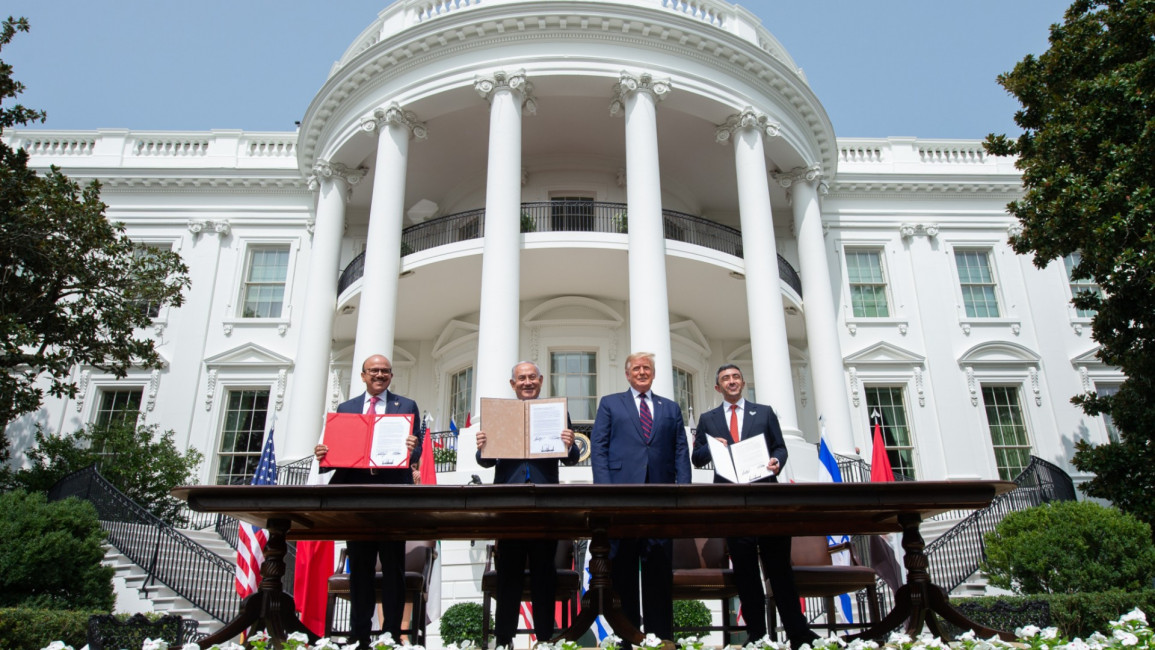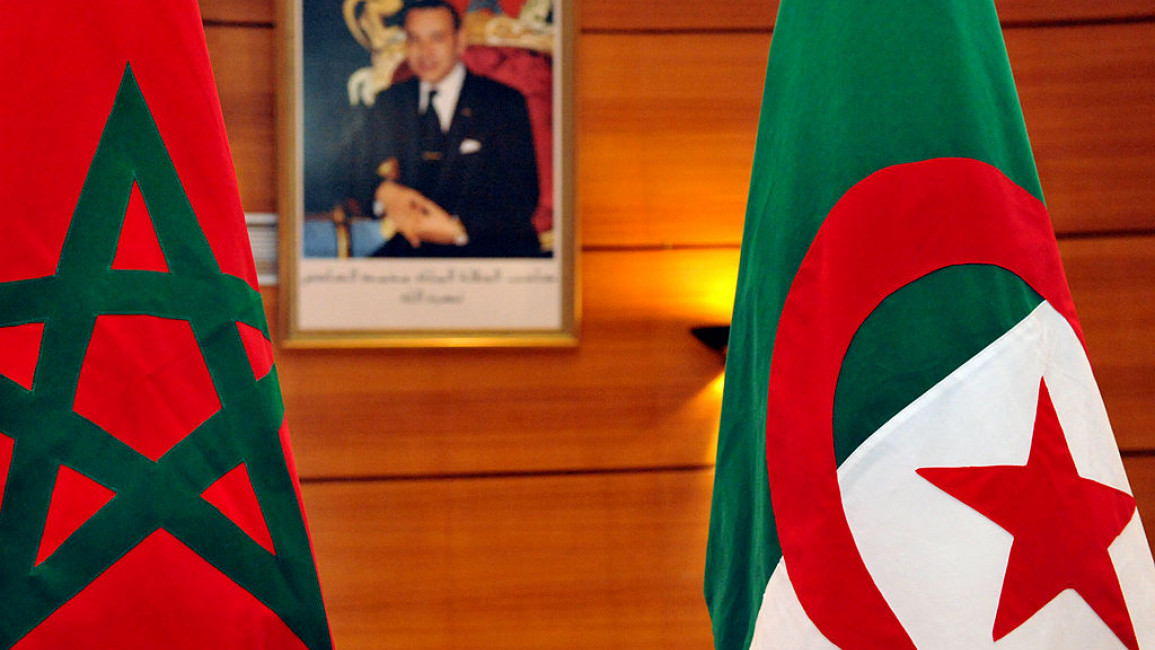![Relations between Algeria and Morocco have been tense for decades [Getty]](/sites/default/files/styles/image_360x240/public/2021-08/GettyImages-137646082.jpg?h=69f2b9d0&itok=s-D53Ssi)
How the Abraham Accords reignited Algeria and Morocco's cold war
![Relations between Algeria and Morocco have been tense for decades [Getty]](/sites/default/files/styles/image_360x240/public/2021-08/GettyImages-137646082.jpg?h=69f2b9d0&itok=s-D53Ssi)
One year ago, on 10 December, just 37 days after Donald Trump lost his re-election bid, the then-lame duck president ended any semblance of US neutrality in the Western Sahara conflict.
Trump announced Washington’s recognition of Moroccan sovereignty over every inch of the territory in exchange for Rabat entering the Abraham Accords, making the North African kingdom the fourth Arab state to normalise relations with Israel in 2020.
Irrespective of how much Trump’s Western Sahara decision violated international law and undermined UN-sponsored efforts to peacefully resolve the conflict, the power centres working to bring more Arab and Muslim countries to the Abraham Accords - chiefly the US, Israel, and the United Arab Emirates (UAE) - fully welcomed the development.
But all of this has been traumatic for Algeria. The US trying to legitimise Moroccan sovereignty over the Western Sahara and the formation of a defence partnership between Rabat and the Jewish state both leave Algiers angry and extremely worried about national security.
"The Algerians fear that they will become vulnerable to Morocco (and Israel) in the long run, if these two states continue to cooperate"
“Israel's alliance with Morocco could mean that in the long-term Rabat becomes militarily superior to Algiers and dominant in the region,” Riccardo Fabiani, the North Africa project director for the International Crisis Group, told The New Arab.
“The Algerians fear that they will become vulnerable to Morocco (and Israel) in the long run, if these two states continue to cooperate.”
Huge geopolitical ramifications
Trump’s Western Sahara decision, which President Joe Biden has not reversed, and Rabat entering the Abraham Accords have both led to the reignition of a North African “cold war”.
Due to several issues that have increased tensions between Rabat and Algiers, the Algerians severed official ties with Morocco on 24 August.
Various factors were in play, including Morocco’s alleged support for the Movement for Self-determination of Kabylie (MAK), a separatist group which the authorities in Algiers have accused of receiving backing from Morocco and Israel, and being behind deadly forest fires in Algeria earlier this year.
But as Fabiani explained, “the increasingly closer defence cooperation between Morocco and Israel is arguably the biggest factor behind the deterioration in the relations between Algiers and Rabat.”
Other experts agree. “The Abraham Accords exacerbated an already existing problem,” said Dr Dalia Ghanem, a resident scholar at the Carnegie Middle East Centre, in an interview with TNA.
“Tensions between Algeria and Morocco always existed but since the Abraham Accords they have worsened. This normalisation that was supposed to bring more peace in the region is not going to do so, and Algeria/Morocco is a case in point.”
The past 12-18 months have put Algiers in a difficult situation. The North African power is positioning itself as a major player which stands against normalisation with Israel under current circumstances, in which Palestinians remain stateless. By voicing opposition to the Abraham Accords and speaking out against Israel gaining observer status at the African Union (AU), Algeria has made its positions crystal clear.
In Dr Ghanem’s words, “for Algeria, which is a country that has no relationship of any sort with Israel, having Morocco normalise with it, lobby for it to get back its observer seat in the AU, and now have defence cooperation is a danger for its national security.”
|
|
Some commentators argue that Algeria is simply focusing on Israel/Palestine, Morocco, and the Western Sahara conflict to distract its citizens from domestic challenges. True, the Algerian leadership uses national anger against Morocco, Israel, and other foreign powers to shift the focus of conversations at home.
Yet that factor doesn’t explain the anger and fears on the part of Algerian officials. Additionally, while ideology is a factor contributing to Algiers’ firm stance against the Abraham Accords, the North African country has practical reasons for opposing normalisation.
“The geopolitical headaches that have popped up in the environment surrounding Algeria over the past 18 months are real,” Jalel Harchaoui, a senior fellow at the Global Initiative Against Transnational Organized Crime, told TNA.
“Algeria has tangible problems that it has to face. It’s not going to necessarily be able to tackle or address them. But those problems are real. There is an actual risk of Israeli submarines floating around more often than before near, or even potentially in, Algerian territorial waters,” he added.
“It’s possible that some [Moroccan-Israel] security cooperation manifests in a tangible way just to the west of the Moroccan-Algerian border in the north. It’s possible. Then you have the three Algerian civilians that were killed, most likely voluntarily, deliberately, and consciously by Morocco because, as I said, it always pays off to provoke Algeria because if Algeria does get angry it ends up paying the cost diplomatically. All the [international] sympathy tends to be concentrated on Morocco.”
"The old status quo, which was predicated on a frozen conflict (Western Sahara), a precarious military balance of power between Morocco and Algeria, and very limited external interference in this region, has been shattered and Algeria now feels exposed to a new threat"
The fast pace at which Morocco and Israel have moved to deepen bilateral ties alarms Algeria. “Now you have Israeli ministers who come next door and announce all kinds of security initiatives, security cooperation with Morocco,” explained Harchaoui.
“Some of it is true. Some of it is less true. Some of it is downright fictious. But it’s very unnerving [to Algiers]. The Israelis accuse Algeria, without providing any evidence, of working closely with Iran to engage in deleterious activities in the area.”
For Algerian officials, Rabat’s strengthening relationship with Tel Aviv raises many questions about Israel’s interests in the region.
“What is Israel going to do in the area now and when is the last time Israel went so far away from its own territory?” asks Harchaoui.
“Why do you have all these innuendos about a security or military partnership with Morocco? What does it mean from a navy perspective? What does it mean in terms of whatever might happen in the northern part of Morocco, just west of the Algerian border? What does it mean for a possible deterioration of the situation in the Western Sahara?”
Painful lessons from a frozen conflict
The Algerians did not adequately prepare for Morocco entering the Abraham Accords and the US recognising Rabat’s sovereignty over the Western Sahara. In short, the ways in which the Western Sahara conflict have unfrozen have left Algeria feeling fearful and isolated.
“The old status quo, which was predicated on a frozen conflict (Western Sahara), a precarious military balance of power between Morocco and Algeria, and very limited external interference in this region, has been shattered and Algeria now feels exposed to a new threat,” said Fabiani.
Indeed, as exemplified by the 2020 Karabakh War, frozen conflicts tend to, at least eventually, unfreeze. How states plan and organise themselves during the periods in which the conflicts are frozen matters. “A well-organised state, if they are party to a frozen conflict, should in theory take advantage of that time to pre-position themselves ahead of a potential unfreezing of the conflict,” Harchaoui told TNA.
“You are supposed to do your homework diplomatically and militarily so that when things kind of get unjammed you have all the diplomatic, ideological, and perceptional protection you need in the right places. Your partners, allies, and friends are prepared for what you’re about to do. Militarily you have enough deterrent to face the new step,” he added.
“That’s what a clever, well-organised state should do if they’re involved in a frozen conflict that goes through this lull period. A lull doesn’t mean that you’re relaxed. It means that you’re going to take advantage of that long period of time to think about contingencies and prepare yourself, which doesn’t mean you’re going to accumulate weapons and look scary. But you could still do a lot of things. To make a long story short, Algeria has not really done that.”
|
|
Escalation in Western Sahara
Since Morocco joined the Abraham Accords a year ago, there has been a steady deterioration on the ground in Western Sahara. Today, violence is re-escalating in the Western Sahara with the Moroccan military attacking Polisario positions, and many observers of the Maghreb are concerned about a new all-out war erupting between the North African kingdom and the Algerian-sponsored Sahrawi separatist group.
“The Algerians have apparently been encouraging the Polisario to change tactics and take a more aggressive stance towards Morocco,” explained Fabiani.
“The appointment of ‘Mahfoud Polisario’ (Nour-Eddine Mekri) as head of the Algerian external intelligence and, later, the Polisario's nomination of Mohamed Wali Akeik as chief of staff (which was probably green-lighted by the Algerian military establishment) point to a willingness to escalate tensions on the ground in Western Sahara.”
With the Moroccan side demonstrating its willingness to wage airstrikes against the Polisario this year, experts warn of Western Sahara moving toward increasingly intensive armed conflict.
“The Polisario resistance…is deeply friendly and close to the Algerian authorities,” Harchaoui told TNA. “But the Algerians could do much more. They could move more weapons there. They could play a more active role through a proxy dynamic if that conflict were to worsen, which is a distinct possibility.”
"Algeria sees [the Abraham Accords] as a danger for the country but also for the entire region. I believe the situation between [Algeria and Morocco] is going to get worse in 2022"
International isolation?
The lack of concrete foreign support against Morocco vis-à-vis the Western Sahara is problematic for Algeria. Among the most powerful Western powers, there’s absolutely no sympathy for Algeria’s position.
Turkey, Egypt, and the GCC states, meanwhile, are on Rabat’s side, highlighted by the sale of Turkish drones to Rabat and numerous Arab states opening (or planning to open) consulates in the Western Sahara.
Russia has sympathy for Algeria’s position on the conflict and Moscow sells weapons to Algeria in large quantities. But neither fact means that Vladimir Putin’s administration will risk its good relationship with Morocco just to solidify its strong partnership behind Algeria in relation to the Western Sahara.
China, which recently sold Algeria drones, might be the power most likely to conduct diplomacy in North Africa in ways that are favourable to Algerian interests and positions. But like Russia, China has a growing partnership with Morocco which is valuable to Beijing for investment, trade, and other key reasons.
It seems far-fetched to imagine the Chinese burning bridges with Morocco over the Western Sahara issue just to please the Algerian leadership. Beijing will probably strive to maintain its neutrality in this conflict.
Put simply, as Algeria faces these worsening geopolitical and security headaches on its borders, the country must “do all of this on its own,” said Harchaoui. “It’s rather isolated.”
Looking ahead, an increasingly isolated Algeria must contend with the ways in which it perceives Morocco and Israel - both with the support of Western governments and Abu Dhabi - to be threatening Algerian security and stability. It does not seem likely whatsoever that Algeria will back down from its positions.
“Algeria sees [the Abraham Accords] as a danger for the country but also for the entire region,” stated Dr Ghanem. “I believe the situation between [Algeria and Morocco] is going to get worse in 2022.”
Giorgio Cafiero is the CEO of Gulf State Analytics.
Follow him on Twitter: @GiorgioCafiero




